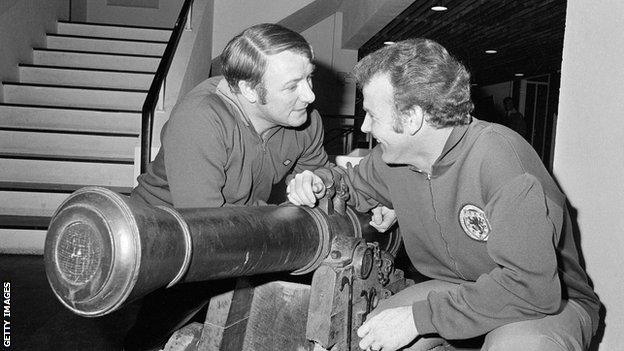Tommy Docherty: Former Man Utd and Scotland boss dies
- Published

Docherty (left) managed Scotland from 1971-72 and is seen here with Billy Bremner before a 1974 World Cup qualifying match in Denmark
Former Manchester United and Scotland manager Tommy Docherty has died at the age of 92 following a long illness.
As a player, Glasgow-born Docherty made more than 300 appearances for Preston and won 25 caps for Scotland.
He went on to manage 12 clubs, leading Chelsea to League Cup success in 1965 and United to a 2-1 win over Liverpool in the 1977 FA Cup final.
"Tommy passed away peacefully surrounded by his family at home," his family said in a statement.
"He was a much-loved husband, father and papa and will be terribly missed.
"We ask that our privacy be respected at this time."
Docherty - affectionately known by his nickname 'The Doc' - died at home in the north west of England on 31 December.
After spells managing Chelsea, Rotherham, QPR, Aston Villa and Porto, he took over as Scotland boss in September 1971 on a temporary basis before getting the job full-time two months later.
But he was best known for his five-year spell at Manchester United, who approached him to succeed Frank O'Farrell in December 1972 while Scotland were on course to qualify for the 1974 World Cup finals.

Docherty won the biggest honour of his managerial career by leading United to the 1977 FA Cup
United were relegated in 1974 under Docherty but they kept the Scot and returned to the top flight at the first time of asking. Two years later, they won the FA Cup with victory over Bob Paisley's Liverpool, who had won the league and would go on to also win the European Cup that year.
Docherty's time at Old Trafford also saw George Best fail to revive his United career, the retirement of Bobby Charlton, and the departure of Denis Law.
In 2014, he told the BBC he still regretted his decision to leave the Scotland job for United.
"I was stupid," he said. "I should have stayed with Scotland. [It was] partly the money, I have to be honest about that."
Docherty was sacked shortly after the Wembley triumph for having an affair with Mary Brown, the wife of United physiotherapist Laurie Brown.
The pair later married and they remained together until his death.
Allow X content?
This article contains content provided by X. We ask for your permission before anything is loaded, as they may be using cookies and other technologies. You may want to read X’s cookie policy, external and privacy policy, external before accepting. To view this content choose ‘accept and continue’.
Docherty returned to management with First Division side Derby in September 1977, then rejoined QPR two years later. A turbulent time at Loftus Road saw him sacked in May 1980, reinstated after just nine days, then sacked again the following October.
Spells at Sydney Olympic, Preston, South Melbourne and Wolves followed, with Docherty's final managerial job coming at non-league Altrincham in 1987-88.
Post-retirement, he worked as an after-dinner speaker and media pundit.
Docherty was inducted into the Scottish Football Hall of Fame in November 2013.
Scottish Football Association president Rod Petrie said Docherty's death meant football had lost "a tremendous personality".
"He was tenacious on the park and a great leader off it," Petrie added.
"Tommy was a regular in the Scotland side in the 1950s that qualified for two World Cups, and his record as Scotland manager was impressive, albeit cut short.
"Looking at the results and performances he inspired, it is hard not to wonder what might have been had he remained.
"His charisma and love for the game shone even after he stopped managing and it was entirely fitting Tommy should be inducted into the Scottish Football Hall of Fame for his lifelong service."
Allow X content?
This article contains content provided by X. We ask for your permission before anything is loaded, as they may be using cookies and other technologies. You may want to read X’s cookie policy, external and privacy policy, external before accepting. To view this content choose ‘accept and continue’.
Allow X content?
This article contains content provided by X. We ask for your permission before anything is loaded, as they may be using cookies and other technologies. You may want to read X’s cookie policy, external and privacy policy, external before accepting. To view this content choose ‘accept and continue’.